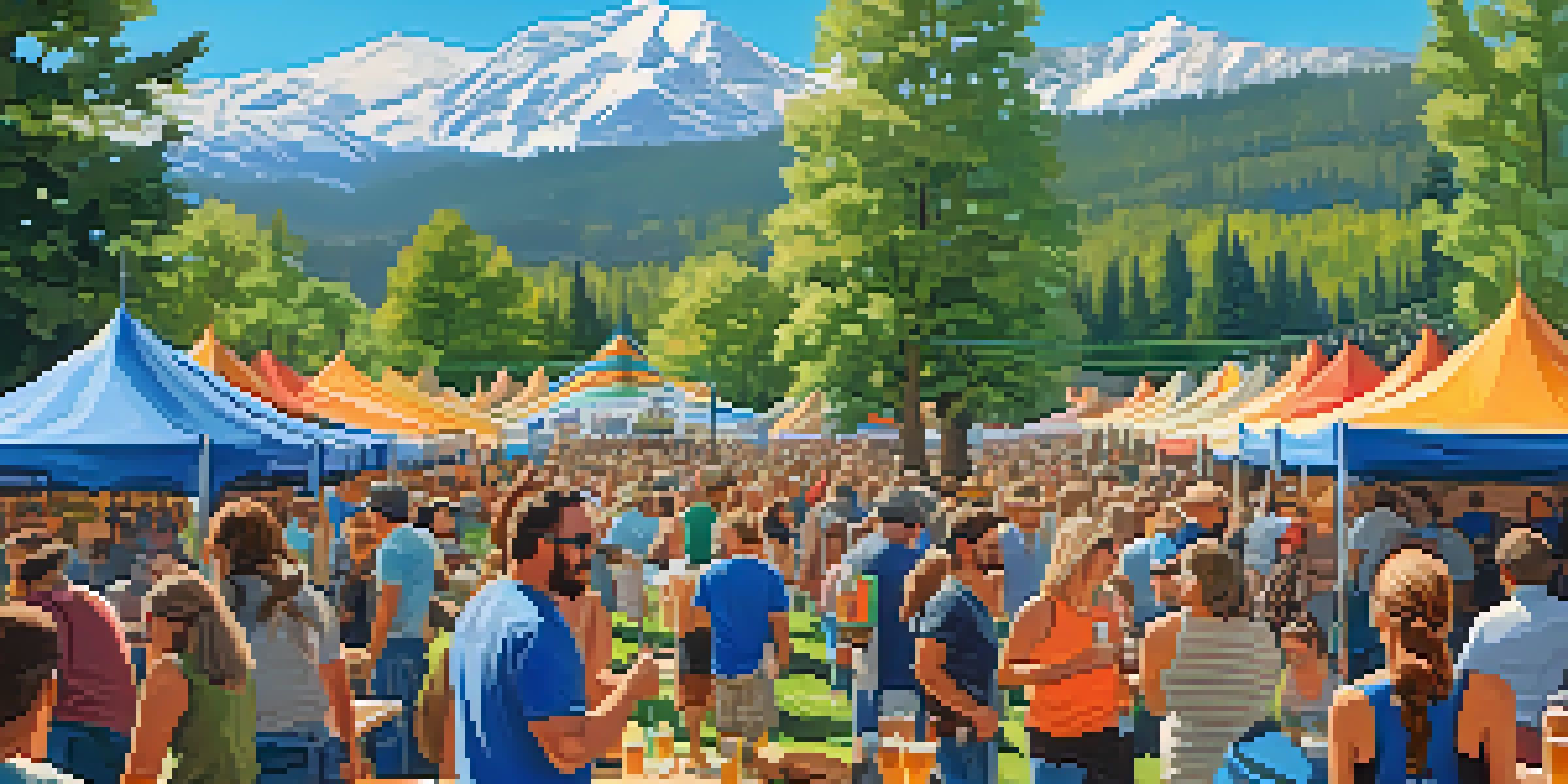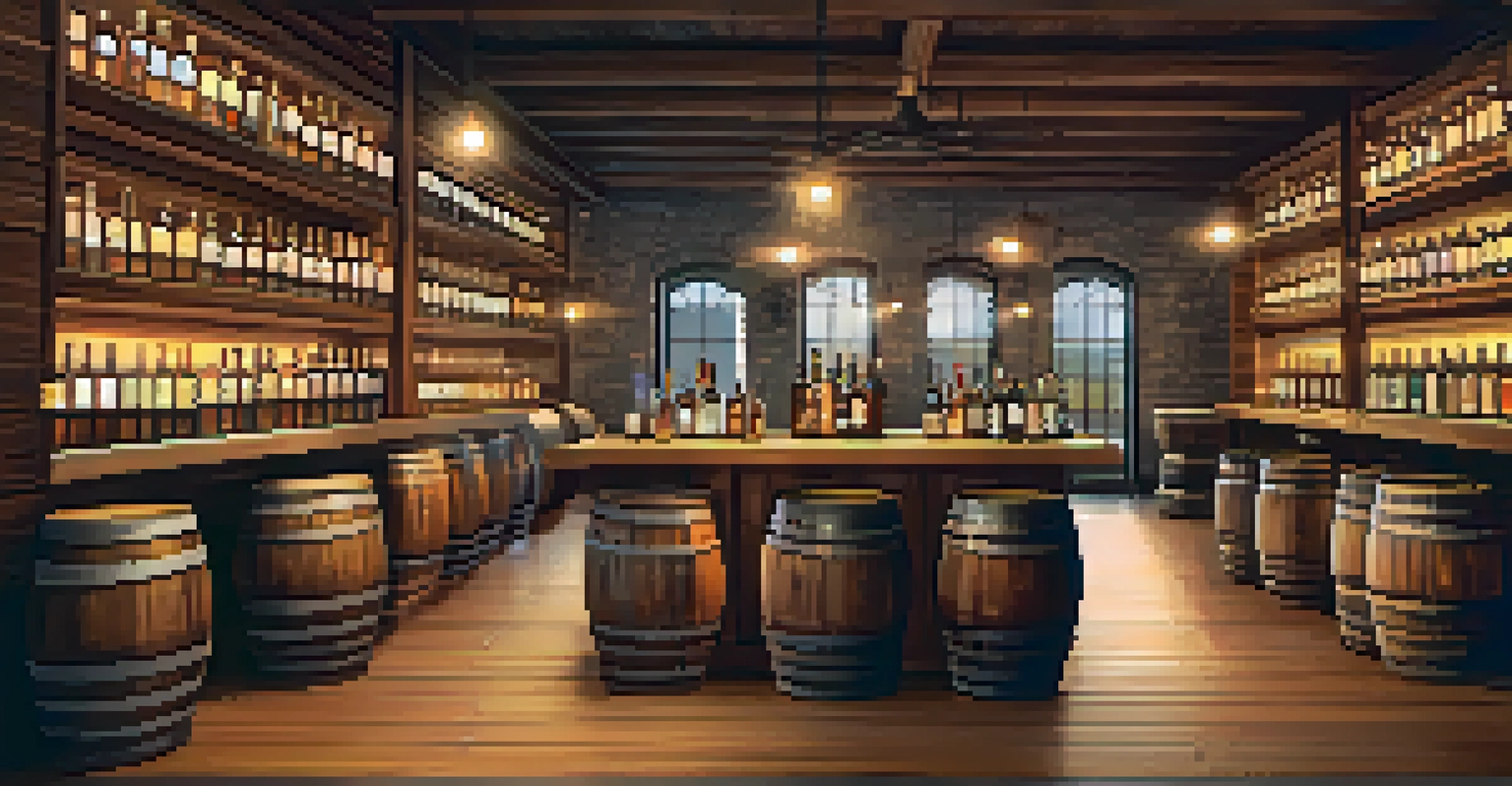The Future of Craft Beer and Distilleries in Colorado

The Rise of Craft Beer Culture in Colorado
Colorado has become a hotspot for craft beer enthusiasts, with a vibrant community of breweries popping up in every corner. The state's unique ingredients and brewing techniques contribute to a diverse selection of flavors that attract both locals and tourists. This growing culture fosters creativity among brewers, allowing them to experiment with styles and ingredients that push the boundaries of traditional beer-making.
Craft beer is a way of life, a community, and a celebration of flavor.
As consumers become more educated about craft beer, they seek out unique and locally sourced options. This trend encourages breweries to focus on sustainability, using local grains and hops to create distinctive brews that reflect Colorado's terroir. The emphasis on community is evident, as many breweries partner with local farms and businesses to create a truly Colorado experience.
Moreover, the craft beer scene has become intertwined with the state's identity, showcasing local pride and attracting significant tourism. Events like the Great American Beer Festival highlight Colorado's brewing prowess, solidifying its reputation as a leader in the craft beer movement. As this culture continues to thrive, it sets the stage for exciting innovations in the future.
Innovations Shaping the Craft Distillery Industry
While craft beer is flourishing, Colorado's distilleries are also experiencing a renaissance. Innovations in distilling techniques and flavor profiles are pushing the envelope, resulting in a diverse range of spirits that cater to sophisticated palates. Distillers are experimenting with unique ingredients and barrel-aging processes to create spirits that stand out in a crowded market.

The trend of craft distilling is closely linked to the farm-to-table movement. Many distilleries prioritize the use of locally sourced grains and fruits, which not only enhances flavor but also supports local agriculture. This commitment to quality and sustainability resonates with consumers who are increasingly conscious of where their products come from.
Craft Beer Thrives in Colorado
Colorado's craft beer scene is booming, fueled by unique local ingredients and a strong sense of community.
Additionally, distilleries are embracing collaborations with local breweries, resulting in unique products that blend the best of both worlds. For instance, some distilleries age whiskey in barrels previously used for beer, infusing their spirits with complex flavors. This spirit of collaboration is essential for the growth of both industries, creating a more dynamic craft beverage landscape.
The Impact of Local Regulations on Growth
Local regulations play a significant role in shaping the craft beer and distillery scene in Colorado. The state has established a framework that supports small businesses, allowing for a thriving environment where innovation can flourish. However, navigating the regulatory landscape can be challenging, requiring entrepreneurs to stay informed and adaptable.
Sustainability is not just a trend; it's a responsibility we all share.
As laws evolve, there’s a push for more supportive measures that encourage growth and creativity. Recent changes have aimed to simplify licensing processes and reduce barriers for new entrants into the market. This is crucial for maintaining the vitality of the industry and ensuring that new ideas can take root without excessive red tape.
Furthermore, local governments are increasingly recognizing the economic impact of craft breweries and distilleries. By supporting these businesses through favorable policies and initiatives, they contribute to job creation and tourism, further solidifying Colorado's reputation as a craft beverage destination.
Sustainability Efforts in Brewing and Distilling
Sustainability is becoming a cornerstone of the craft beer and distillery industries in Colorado. Many breweries and distilleries are adopting eco-friendly practices, from utilizing renewable energy sources to implementing water conservation measures. This shift not only reduces their environmental footprint but also appeals to consumers who value sustainability in their purchasing decisions.
Additionally, the use of local ingredients reduces transportation emissions and supports the local economy. Many establishments are now focusing on zero-waste practices, finding innovative ways to repurpose byproducts from brewing and distilling processes. For example, spent grains from breweries can be used for animal feed or repurposed into baked goods, creating a circular economy.
Sustainability Drives Distilling
Many Colorado distilleries are prioritizing sustainability by using locally sourced ingredients and eco-friendly practices.
As these sustainability efforts gain traction, they are likely to influence consumer preferences and industry standards. The commitment to sustainability can enhance brand loyalty, as customers increasingly seek out businesses that align with their values. This trend positions Colorado's craft beverage scene as a leader in responsible production.
The Role of Technology in Beer and Spirit Production
Technology is revolutionizing the way craft breweries and distilleries operate, making processes more efficient and precise. From advanced brewing systems to innovative fermentation techniques, technology is helping producers enhance quality while reducing waste. This not only improves the product but also allows for greater consistency across batches.
Moreover, data analytics is becoming a powerful tool for both brewers and distillers. By analyzing consumer preferences and sales trends, businesses can tailor their offerings to meet market demands. This data-driven approach helps craft producers stay competitive in a rapidly evolving landscape, ensuring they are always in tune with their customers.
As technology continues to advance, we can expect even more exciting developments in the craft beverage industry. Virtual reality experiences, for example, could allow customers to tour breweries and distilleries from the comfort of their homes, enhancing engagement and education about the craft process.
The Importance of Community and Collaboration
Community is at the heart of Colorado's craft beer and distillery scene. Many establishments prioritize building relationships with their neighbors, whether through collaborative brewing projects or community events. This sense of camaraderie fosters a supportive environment where businesses can thrive together rather than compete against one another.
Collaboration extends beyond breweries and distilleries, involving local artists, musicians, and food vendors. Events that showcase local talent not only draw in crowds but also create a unique atmosphere that celebrates Colorado's rich culture. These partnerships enhance the overall experience for consumers, making visits to craft establishments more than just about the product.
Community Fuels Craft Beverage Growth
Collaboration among breweries, distilleries, and local artists fosters a vibrant community and enhances the consumer experience.
As the craft beverage industry continues to grow, this commitment to community will be vital. By working together, businesses can create a strong network that benefits everyone involved, ultimately strengthening Colorado's reputation as a premier destination for craft beer and spirits.
Future Trends to Watch in Craft Beverages
Looking ahead, several trends are poised to shape the future of craft beer and distilleries in Colorado. One notable trend is the rise of non-alcoholic and low-alcohol options, catering to consumers who are seeking alternatives without sacrificing flavor. As health-conscious choices become more mainstream, expect to see innovative offerings that appeal to a broader audience.
Additionally, the craft beverage industry is likely to embrace more diverse flavor profiles and styles. With brewers and distillers eager to experiment, we can anticipate a surge in unique combinations that reflect global influences. This exploration of flavors not only piques consumer interest but also encourages a deeper appreciation for the craft.

Finally, as the industry continues to grow, there will be an increased focus on education and experience. Consumers are eager to learn about the craft process, and businesses that offer workshops, tastings, and tours will likely thrive. This emphasis on connection and knowledge will enhance the overall craft beverage culture in Colorado, ensuring its continued vibrancy.